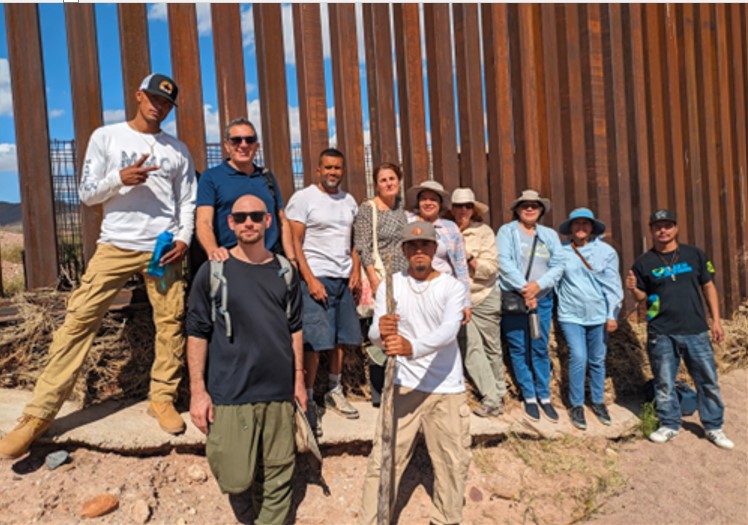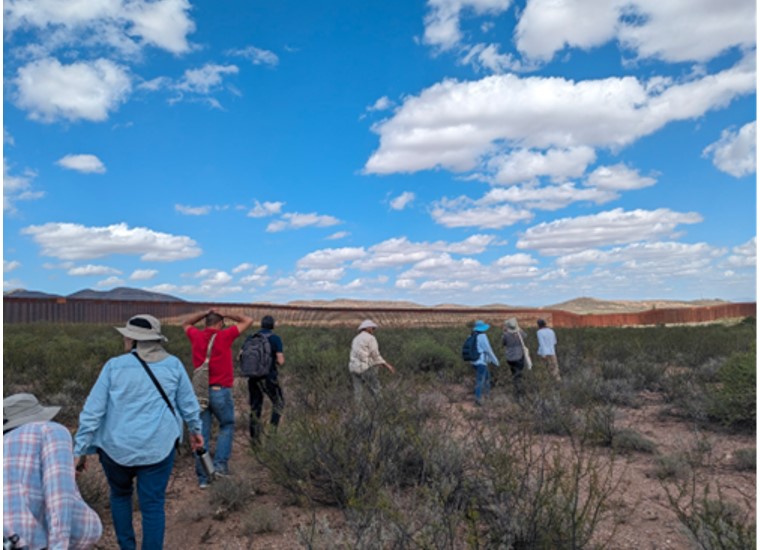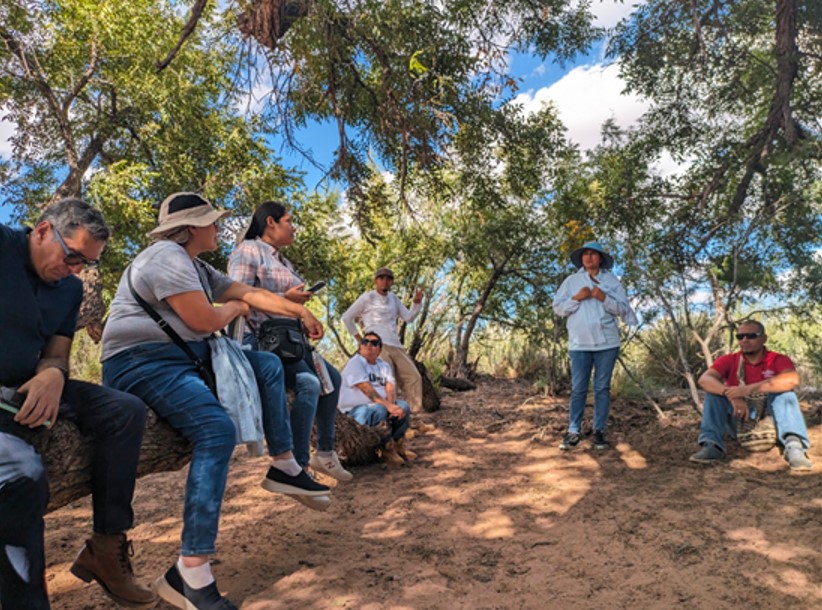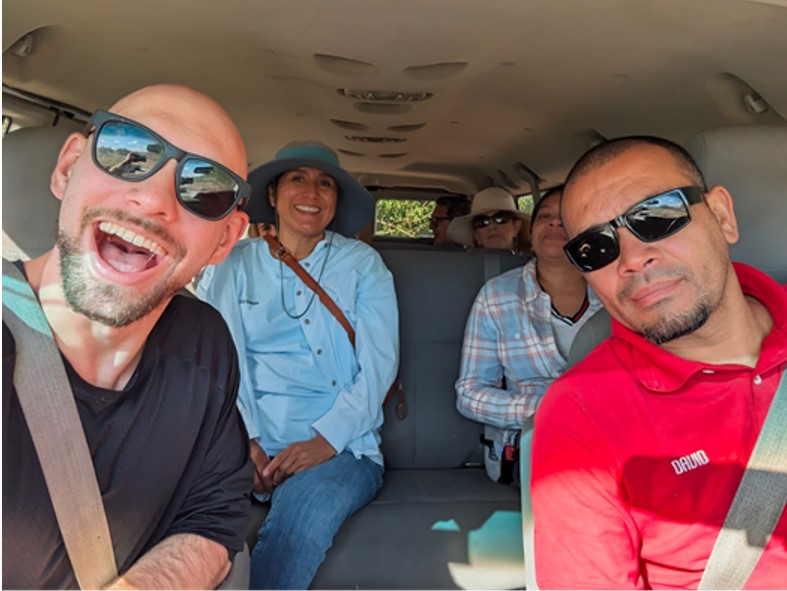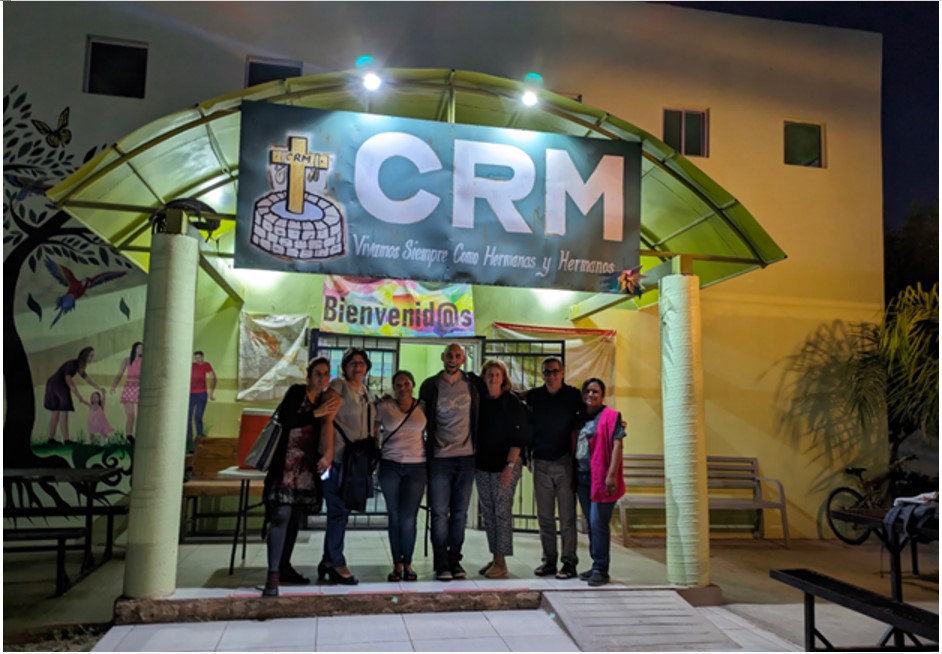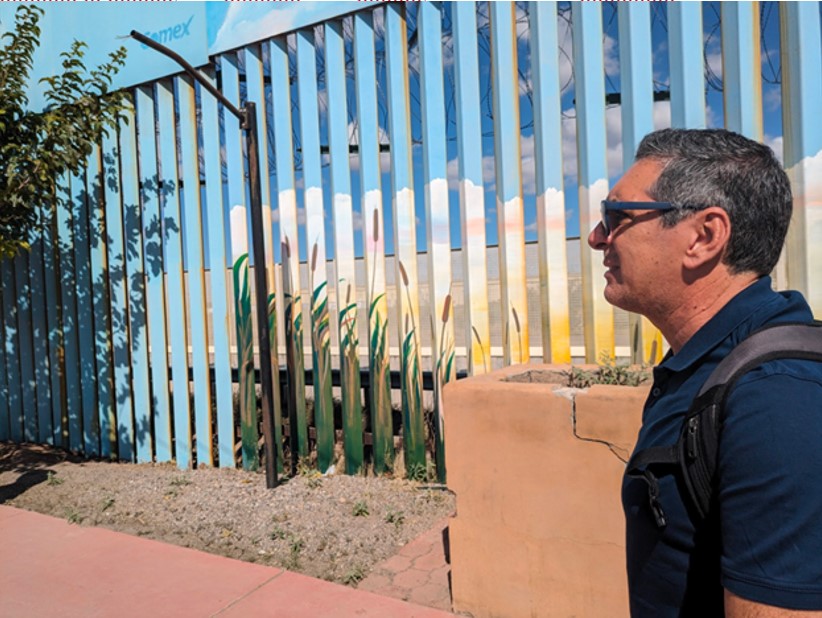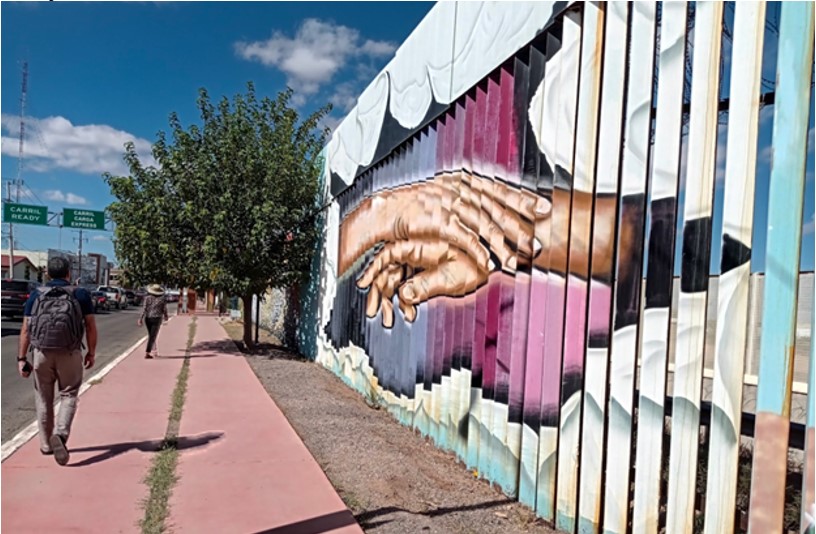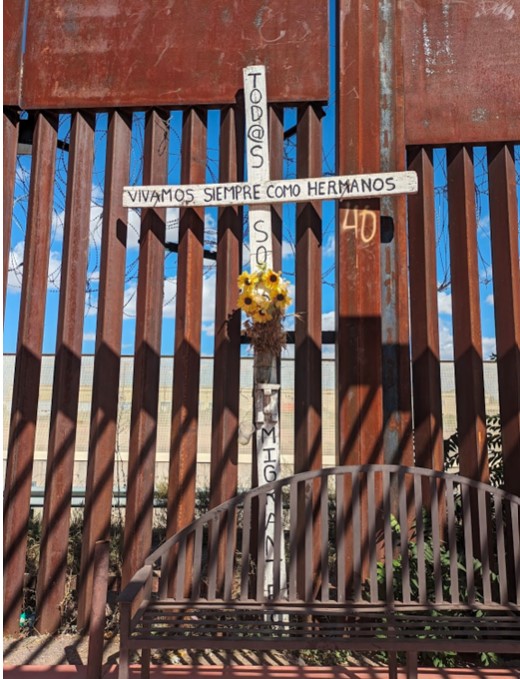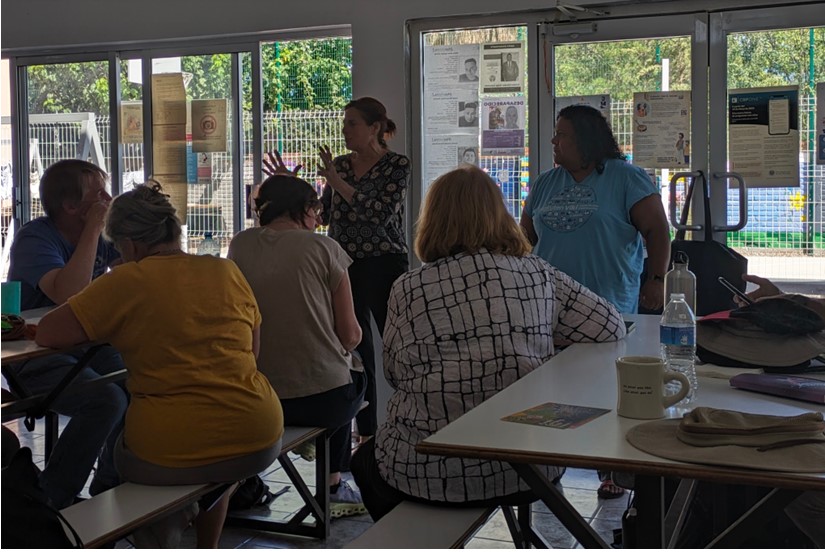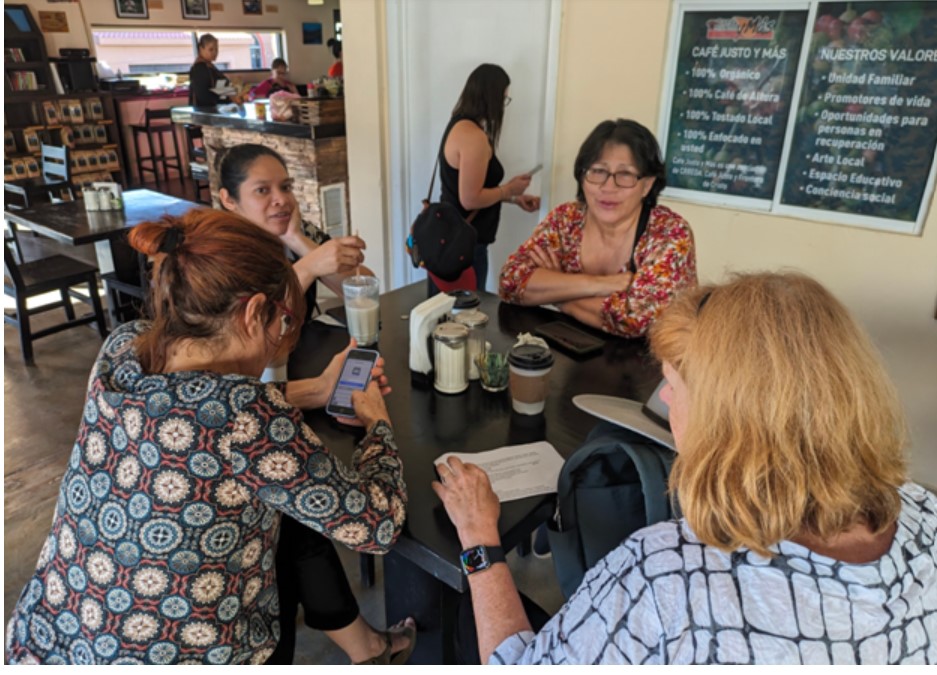A Letter from Joseph Russ, serving in the Northern Triangle of Central America
Winter 2023
Write to Joseph Russ
Individuals: Give online to E132192 in honor of Joseph Russ’ ministry
Congregations: Give to D500115 in honor of Joseph Russ’ ministry
Churches are asked to send donations through your congregation’s normal receiving site (this is usually your presbytery)
Subscribe to my co-worker letters
Dear friends,
In 2023, Noemí spent a month in the United States with the PC(USA)’s Peacemaking Program. Together with several other peacemakers, she visited the border between the United States and Mexico. I had the privilege of accompanying them. At the border, we learned the story of a young Salvadoran who, two months earlier, had to leave his home, community and country to go to the United States, but under extremely difficult conditions.
Due to immigration policy issues and the urgency of his departure, the young man had to go “irregularly,” crossing the forests and rivers of Central America, going up through Mexico and finally walking through the desert to reach the border of Mexico and the U.S. In El Salvador, the dangers and risks of irregular migration are well known. A person entrusts his/her life to those in charge of shelters, be it churches like the Scalabrinian priestly order or individuals and is at the mercy of coyotes and organized crime. An irregular immigration status places you in a vulnerable situation. If a person is in a country without documentation, they too often can neither access health services, report violence committed against them, nor ensure compliance with their labor rights for fear of deportation. Many people who migrate share this story.
Deportation or expulsion all too often means death. It can be the quick and direct death of a person fleeing gangs, as pointed out in the Human Rights Watch report “Deported to Danger.” Or it could be the indirect and slow death of poverty, as the Salvadoran theologian Jon Sobrino in his book Jesus Christ the Liberator points out. Academic Daniel Kanstroom criticizes the lack of proportionality that allows a civil process such as expulsion to become this type of death sentence. Migrating irregularly requires one to hide to survive and to walk in the shadow of death.These realities are known to many people secondhand; every person has heard the stories of the terror and pain of migrants. However, very few people know the border where this happens or the organizations that try to improve this situation.
__
“You are no longer strangers and foreigners, but fellow citizens of the chosen people and members of the household of God, built on the foundation of the apostles and prophets, Christ Jesus himself being the cornerstone” (Ephesians 2: 19-20).
Every year, the Presbyterian Mission Agency’s Peacemaking Program facilitates the International Peacemakers program, a program that brings together a cohort of people from around the world to travel for a month in the U.S. and share about their work in their communities, countries and contexts. In 2023, two peacemakers named Milagro and Noemí from El Salvador participated. Together with, Efi Latsoudi, a peacemaker from Greece, they went to the border between the U.S. and Mexico to learn about the reality there, and to share about the reality around the migration in Greece, El Salvador and the U.S.
We walked through the desert and saw the migrant trails, the famous wall and the cameras that monitor the desert. We walked in the sun along dry streams and saw the scarcity of water. What we cross by truck in a few hours is crossed by migrants on foot walking for days, enduring the cold at night and the heat during the day.
Afterwards, we did a group biblical reflection with the humanitarian assistance group that accompanied us. We read Ephesians 2: 16-20, we listened to the story of the young man who had to migrate irregularly, and in a circle, we shared what reflection the text inspired in us about the unifying power of the Holy Spirit, and this prophetic vision of a people no longer strange or foreign. Everyone lamented the human cruelty that causes us to fall short of this vision, but Noemí’s words in particular impacted our reflection. In summary, she said, “Dios no hizo fronteras. God made no borders,” and lamented the difficulties faced by the young man who had to leave El Salvador in search of the yearned-for American dream. Seeing the path he had walked, she asked, “Why do they put so many obstacles in front of people just looking for a better life?”
__
“Why do they put up so many obstacles?” – Noemí
As a Christian church, we believe in a God who seeks the connection and union of His dispersed people. The New Jerusalem is a vision of people of all nations. Pentecost facilitates intercultural communication and the breakdown of barriers. Jesus speaks with Canaanite and Samaritan women. And Leviticus 19:33-34 makes it clear, “When a foreigner settles in your country, do not treat them badly. On the contrary, treat them as if they were one of you. Love them as yourselves, for you too were strangers in Egypt. I am the Lord your God.” So, it is clear, from the scriptures, we have the duty not only to accept and help them, but even to love them.
But then the question resonates even louder: why then do we put up so many obstacles?
According to the sociologist Douglas Massey, in his essay “Origins of the New Latino Underclass,” this marginalization serves not only to prevent migration, but to ensure an exploitable working class, and that this exploitable class is mainly from Latin America. We have seen that undocumented migration places people in a vulnerable situation because they cannot access their rights. If a person violates their labor rights, they cannot file a report. If you face sexual violence or abuse, you cannot go to the police. The result, then, is that there is a growing class of people who can be underpaid and abused at work, physically, sexually and emotionally. This exploitable class is the result of the immigration policy of the U.S.; the threat of deportation is what creates the conditions necessary for this exploitation. These policies configure a racial caste and result in the sinful union between xenophobia, racism and economic exploitation. And we know from Exodus 22:21 that God opposes the exploitation of foreigners, “Do not mistreat or oppress foreigners in any way. Remember that you too were a stranger in the land of Egypt.”
For this population to be exploited (an exploitation that is a sin), some people must be sacrificed to deportation. Jon Sobrino calls the masses impoverished by the sins of the rich “the crucified people,” and it seems that deported migrants can also be included within this understanding. For their exploitation, some people are “crucified” by deportation, which is, as we saw above, a death sentence.
Why do they put up so many obstacles? Because these obstacles satisfy the demands of the sins of xenophobia, racism and economic exploitation. The militarization of the border and the criminalization of migration are the ways through which the institutionalization of this sin that becomes structural is guaranteed. It becomes so structural that even Christians who want to exercise our faith to help, embrace and love our neighbors are restricted in our ability to do so. That is why churches must fight for dignified treatment of migrants.
__
“God made no borders.” – Noemi
In Agua Prieta, we met people working to change this reality from the border itself. Our partners and friends at Frontera de Cristo support various ministries and share stories with visiting groups like ours. Angels in the Desert provide water and give food to people who arrive hungry and thirsty in the desert. The Migrant Resource Center receives and guides migrants to find a regular path and prevents them from falling into the hands of organized crime. It is a work that addresses every aspect of the needs of migrants, from their immediate emergency needs to the socialization of information and the mobilization of other communities and churches to influence migration policies. It is a job that can only be done by joining together to struggle together for a better world.
Motivated by our faith, several churches are coming together to continue on this same path of changing this reality. We believe in a God of life who desires welcome and hospitality, and who opposes the exploitation and oppression of migrants. We see the face of God in people like the young man in the story just like Noemí saw and we firmly believe in our calling to fight against the injustice he faces.
This group is convened to promote the acceptance and fulfillment of the rights of migrants. In March 2024, the Mission Network on Migration in Central America will be launched. This effort responds to a 2018 General Assembly resolution and will work to put an end to this violence and this death and to receive the migrant as the Bible says, as born among us. We will work for a world that recognizes that “God made no borders.”
If you are interested in participating in these efforts, attending and/or financially supporting the launch event, you can write to me directly.
Thank you so much,
Joseph
![]() You may freely reuse and distribute this article in its entirety for non-commercial purposes in any medium. Please include author attribution, photography credits, and a link to the original article. This work is licensed under a Creative Commons Attribution-NonCommercial-NoDeratives 4.0 International License.
You may freely reuse and distribute this article in its entirety for non-commercial purposes in any medium. Please include author attribution, photography credits, and a link to the original article. This work is licensed under a Creative Commons Attribution-NonCommercial-NoDeratives 4.0 International License.
